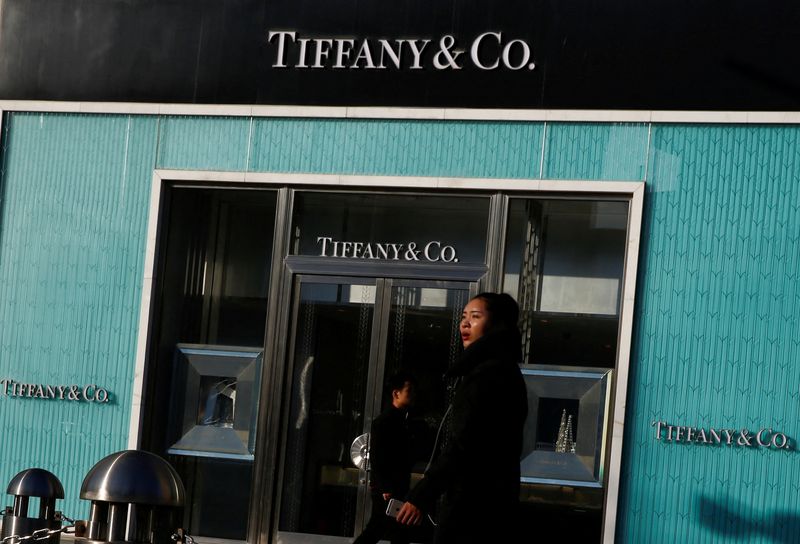By Casey Hall and Mimosa Spencer
SHANGHAI/PARIS (Reuters) -The world's biggest luxury brands seeking growth in their second-largest market China are all courting the likes of wealthy entrepreneur Diana Wang.
Shanghai-based Wang, an investor who also owns a namesake fashion label, is an avid collector of fine jewellery who regularly shops at Cartier, Tiffany and Chopard, among others.
She is also what luxury companies call a VIC, or very important client, a segment of the market they are increasingly targeting as China's post-pandemic economic slowdown dries up the spending power of the once-aspirational middle-class that for years generated the bulk of their revenue growth.
Last month, Wang attended a gala dinner hosted by Tiffany, owned by the world's biggest luxury firm LVMH, which also launched its new collection of high jewellery with private sales appointments for select clients.
"Luxury brands offer you this event experience, this personal experience and it makes you feel privileged," Wang told Reuters. "It's a big part of what makes me want to buy the brand."
The lack of a strong rebound in luxury demand following China's post-pandemic re-opening has spooked investors, adding to jitters about the industry's prospects.
Shares in LVMH are down around 17% since July, while Richemont is 24% lower. This week, Burberry also flagged low double-digit growth due to a slowdown in luxury spending globally, and in China.
To overcome, brands are focusing on selling fewer, more valuable items, relying on the 5% of luxury consumers who, according to HSBC analysts, account for more than 35% of their sales in China.
Offering perks such as exclusive access and meet-the-designer events to this handful of clients is a tried-and-tested strategy for luxury brands globally, but not one that they have employed as much in the past in China, where mass events aimed at raising brand awareness and whetting the luxury appetites of new consumers were more the norm.
From 2019 to the beginning of 2022, China's domestic luxury sales doubled and some brands recorded year-on-year growth rates of 40-60% with middle class consumers accounting for "more than half" of that growth, according to Jacques Roizen, managing director of consulting at Digital Luxury Group.
Now, a property crisis and record-high youth unemployment have forced high-end retailers from Chanel to Cartier-owner Richemont and Gucci-parent Kering (EPA:PRTP) to compete for the discretionary spend of those fewer, wealthier customers still keen to treat themselves.
"It's not only about advertising and communication," said Jean-Marc Duplaix, chief financial officer and deputy chief executive of Kering, referring to company investments to woo shoppers across the spectrum globally. "It's more broadly about how we engage with customers."
INTIMATE & EXCLUSIVE
Making Chinese VICs feel important is central to that engagement.
At the Shanghai gala, Tiffany made sure a celebrity was sat at every table, Wang said. Versace, owned by Capri Holdings (NYSE:CPRI) which is in the midst of a $8.5 billion takeover by Tapestry (NYSE:TPR), also recently held an intimate dinner for about 40 people at the historic Bund with designer Donatella Versace.
Gucci, Chanel and Dior have also set aside more retail space in Shanghai exclusively for their wealthiest clients.
"We pay a lot of attention to the details and the anchorage to local culture," said Cartier Chief Executive Cyrille Vigneron. The brand will hold its annual entrepreneurship awards for women in Shenzhen in May.
Executives at rival LVMH are also keen for that local edge, with Louis Vuitton recently opening a pop-up bookstore and cafe in Shanghai with a billboard in the local dialect and also launching a Mandarin-language podcast.
FEEDING THE LUXURY HABIT
Even as they narrow their focus, luxury brands remain optimistic about the potential in China, which is forecast to account for almost 40% of global luxury sales by 2030, according to consultants Bain.
And unlike foreign financial firms and companies in other industries which are shrinking their presence in China as geopolitical tensions rise and "derisking" takes precedence over potential market opportunities, many luxury companies say they are here to stay.
"We think medium and long-term development potential remains strong," said Eric du Halgouet, executive president of finance at Hermes, whose Birkin handbag is a coveted hallmark of wealth.
Luxury consultant Mario Ortelli said several luxury firms are hedging their bets on China by also expanding their global footprint. This year has also seen many events and openings in South Korea, Japan and Thailand, as well as China.
"But you still need to invest in your biggest market and one that is an engine of growth," Ortelli said. "The only way for luxury companies to protect themselves is to make your brand as desirable as possible so you are the last one that a cost-cutting customer will stop buying."
As China's economic growth sputters, even VICs like Wang say they are thinking more carefully about the value of the luxury goods they are buying. That, however, isn't necessarily bad news for retailers.
"We will think twice or three times now before spending more money than usual," Wang said. "Though I wouldn't say we will stop buying, it's become a habit now."
